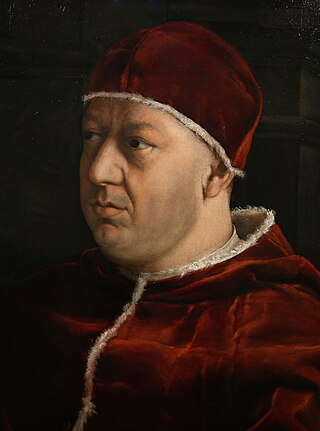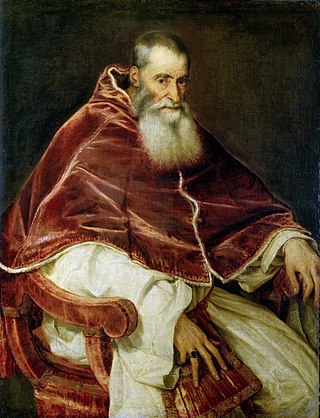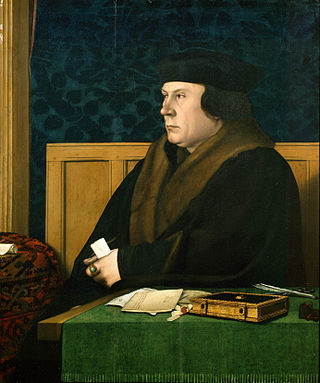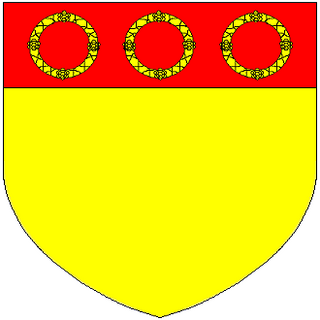
Otho was Roman emperor, ruling for three months from 15 January to 16 April 69. He was the second emperor of the Year of the Four Emperors.

Pope Leo X was head of the Catholic Church and ruler of the Papal States from 9 March 1513 to his death, in December 1521.

Anne of Cleves was Queen of England from 6 January to 12 July 1540 as the fourth wife of Henry VIII. Little is known about Anne before 1527, when she became betrothed to Francis, Duke of Bar, son and heir of Antoine, Duke of Lorraine, although their marriage did not proceed.

Pope Paul III was head of the Catholic Church and ruler of the Papal States from 13 October 1534 to his death, in November 1549.

Thomas Cromwell, briefly Earl of Essex, was an English statesman and lawyer who served as chief minister to King Henry VIII from 1534 to 1540, when he was beheaded on orders of the king, who later blamed false charges for the execution.

The Sabines were an Italic people who lived in the central Apennine Mountains of the ancient Italian Peninsula, also inhabiting Latium north of the Anio before the founding of Rome.
Richard Flecknoe was an English dramatist, poet and musician. He is remembered for being made the butt of satires by Andrew Marvell in 1681 and by John Dryden in Mac Flecknoe in 1682.

The Country Wife is a Restoration comedy written by William Wycherley and first performed in 1675. A product of the tolerant early Restoration period, the play reflects an aristocratic and anti-Puritan ideology, and was controversial for its sexual explicitness even in its own time. The title contains a lewd pun with regard to the first syllable of "country". It is based on several plays by Molière, with added features that 1670s London audiences demanded: colloquial prose dialogue in place of Molière's verse, a complicated, fast-paced plot tangle, and many sex jokes. It turns on two indelicate plot devices: a rake's trick of pretending impotence to safely have clandestine affairs with married women, and the arrival in London of an inexperienced young "country wife", with her discovery of the joys of town life, especially the fascinating London men. The implied condition the Rake, Horner, claimed to suffer from was, he said, contracted in France whilst "dealing with common women". The only cure was to have a surgeon drastically reduce the extent of his manly stature; therefore, he could be no threat to any man's wife.
Satire VI is the most famous of the sixteen Satires by the Roman author Juvenal written in the late 1st or early 2nd century. In English translation, this satire is often titled something in the vein of Against Women due to the most obvious reading of its content. It enjoyed significant social currency from late antiquity to the early modern period, being read as a proof-text for a wide array of misogynistic beliefs. Its current significance rests in its role as a crucial body of evidence on Roman conceptions of gender and sexuality.

Robert Gould was a significant voice in Restoration poetry in England.

John Skelton, also known as John Shelton was an English poet and tutor to King Henry VIII of England. Writing in a period of linguistic transition between Middle English and Early Modern English, Skelton is one of the most important poets of the early Tudor period. Though strongly influenced by the Chaucerian tradition, Skelton is mostly remembered for his poems on everyday themes and invectives, written in an irregular metre now usually called Skeltonics. He also wrote the first secular morality play in English, Magnyfycence, an important landmark in the development of English Renaissance theatre.

Sexual attitudes and behaviors in ancient Rome are indicated by art, literature, and inscriptions, and to a lesser extent by archaeological remains such as erotic artifacts and architecture. It has sometimes been assumed that "unlimited sexual license" was characteristic of ancient Rome, but sexuality was not excluded as a concern of the mos maiorum, the traditional social norms that affected public, private, and military life. Pudor, "shame, modesty", was a regulating factor in behavior, as were legal strictures on certain sexual transgressions in both the Republican and Imperial periods. The censors—public officials who determined the social rank of individuals—had the power to remove citizens from the senatorial or equestrian order for sexual misconduct, and on occasion did so. The mid-20th-century sexuality theorist Michel Foucault regarded sex throughout the Greco-Roman world as governed by restraint and the art of managing sexual pleasure.

Homosexuality in ancient Rome often differs markedly from the contemporary West. Latin lacks words that would precisely translate "homosexual" and "heterosexual". The primary dichotomy of ancient Roman sexuality was active / dominant / masculine and passive / submissive / feminine. Roman society was patriarchal, and the freeborn male citizen possessed political liberty (libertas) and the right to rule both himself and his household (familia). "Virtue" (virtus) was seen as an active quality through which a man (vir) defined himself. The conquest mentality and "cult of virility" shaped same-sex relations. Roman men were free to enjoy sex with other males without a perceived loss of masculinity or social status as long as they took the dominant or penetrative role. Acceptable male partners were slaves and former slaves, prostitutes, and entertainers, whose lifestyle placed them in the nebulous social realm of infamia, so they were excluded from the normal protections afforded to a citizen even if they were technically free. Freeborn male minors were off limits at certain periods in Rome.

Revelations of Divine Love is a medieval book of Christian mystical devotions. Containing 87 chapters, the work was written between the 14th and 15th centuries by Julian of Norwich, about whom almost nothing is known. It is the earliest surviving example of a book in the English language known to have been written by a woman. It is also the earliest surviving work written by an English anchorite or anchoress.

A Satire of the Three Estates, is a satirical morality play in Middle Scots, written by makar Sir David Lyndsay. The complete play was first performed outside in the playing field at Cupar, Fife in June 1552 during the Midsummer holiday, where the action took place under Castle Hill. It was subsequently performed in Edinburgh, also outdoors, in 1554. The full text was first printed in 1602 and extracts were copied into the Bannatyne Manuscript. The Satire is an attack on the Three Estates represented in the Parliament of Scotland – the clergy, lords and burgh representatives, symbolised by the characters Spiritualitie, Temporalitie and Merchant. The clergy come in for the strongest criticism. The work portrays the social tensions present at this pivotal moment in Scottish history.

Sir Richard Morrison was an English humanist scholar and diplomat. He was a protégé of Thomas Cromwell, propagandist for Henry VIII, and then ambassador to the German court of Charles V for Edward VI.

Catherine Howard was Queen of England from July 1540 until November 1541 as the fifth wife of King Henry VIII. She was the daughter of Lord Edmund Howard and Joyce Culpeper, a cousin to Anne Boleyn, and the niece of Thomas Howard, 3rd Duke of Norfolk. Thomas Howard was a prominent politician at Henry's court. He secured her a place in the household of Henry's fourth wife, Anne of Cleves, where Howard caught the King's interest. She married him on 28 July 1540 at Oatlands Palace in Surrey, just 19 days after the annulment of his marriage to Anne. He was 49, and it is widely accepted that she was about 17 at the time of her marriage to Henry VIII.

The Author's Farce and the Pleasures of the Town is a play by the English playwright and novelist Henry Fielding, first performed on 30 March 1730 at the Little Theatre, Haymarket. Written in response to the Theatre Royal's rejection of his earlier plays, The Author's Farce was Fielding's first theatrical success. The Little Theatre allowed Fielding the freedom to experiment, and to alter the traditional comedy genre. The play ran during the early 1730s and was altered for its run starting 21 April 1730 and again in response to the Actor Rebellion of 1733. Throughout its life, the play was coupled with several different plays, including The Cheats of Scapin and Fielding's Tom Thumb.

Baldassare Castiglione, Count of Casatico, was an Italian courtier, diplomat, soldier and a prominent Renaissance author.
John London, DCL was Warden of New College, Oxford, and a prominent figure in the Dissolution of the Monasteries during the reign of Henry VIII of England.
















